20 Nov 17 | News and features, Turkey, Turkey Uncensored
[vc_row][vc_column][vc_column_text]
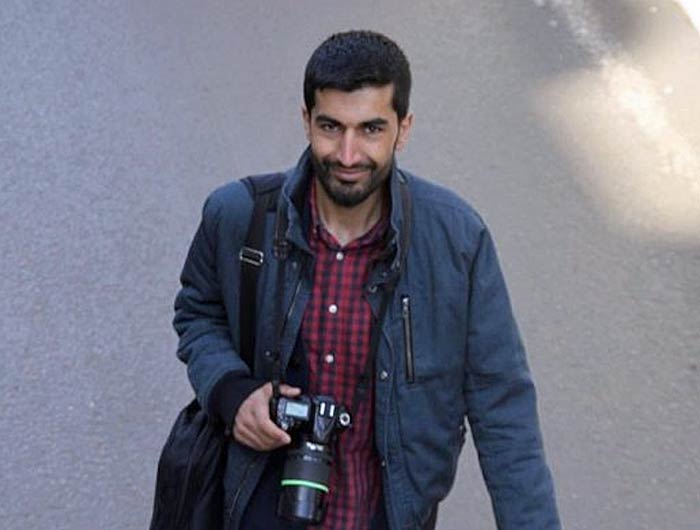
Nedim Türfent has been under detention for more than 18 months. The 5th hearing of his trial will be heard on Dec. 15 at the Hakkari Courthouse. © Mezopotamya Agency
“If we wanted to do, we could kill you right here and then say you were killed during the incidents. No one would be able to prove otherwise.”
That’s what police officers told journalist Nedim Türfent when they arrested him more than 18 months ago.
During the fourth hearing in his trial in the southeastern province of Hakkari on Friday 17 Nov, Türfent, a local correspondent and English news editor for the Dicle News Agency, informed the court about the abusive treatment he had suffered at the hands of authorities. The case had already attracted attention after 19 of 20 witnesses confessed to testifying against Türfent under torture and duress.
Türfent’s description of overt police threats has added more insult to injury in a case that lacks any evidence other than fallacious testimonies. “Don’t worry, we’re going to prepare such a file on you that you’ll be in for at least 20 years. You won’t be getting out anytime soon,” Türfent quoted police as saying during his hearing. The journalist faces up to 22.5 years in prison on charges of “membership in a terrorist organisation” and “conducting propaganda.” His 18 months in detention could be extended further in the next hearing on 15 Dec.
The fierce crackdown on Turkey’s mainstream media has been covered widely. But this has also created a certain “butterfly effect.” As the government dares to imprison renowned journalists in the “west” – Istanbul – the knock-on effect is much greater for Kurdish journalists in the east as they are sent back in time to face the dark spectres of the 1990s: intimidation, death threats, detentions and ill-treatment. The retaliation against Türfent for his journalistic work in his hometown of Yüksekova is one compelling example.
Yüksekova – Gever to the Kurdish locals – sits on a small flat plain that is surrounded by majestic and jagged peaks that pierce the sky. Located in Hakkari, which borders Iraq and Iran, it is the largest urban area in the country’s deprived southeastern corner. Toughened by the landscape, people from Gever are known to be self-resilient, proud and stubbornly uncompromising against any type of pressure – be it extreme weather or government crackdown. The same can be said for Türfent’s journalism. His bold coverage of the military siege and crackdown in the town in March-April 2016 made him a target.[/vc_column_text][/vc_column][/vc_row][vc_row][vc_column][vc_video link=”https://www.youtube.com/watch?v=Yu5HL0b2GwE”][/vc_column][/vc_row][vc_row][vc_column][vc_column_text]One of Türfent’s stories received country-wide media attention when it revealed footage of a commander of special forces inflicting ill-treatment on a group of detainees. “You will see the power of the Turk,” the commander shouted. The story made a tremendous impact, with the prime ministry announcing that it would open a probe over the images.
But then came the death threats, harassment and, eventually, detention for the journalist who broke the story.
“Nedim is being punished for relating the state oppression in Yüksekova during the curfews,” said Nimet Ölmez, a fellow reporter with Mezopotamya Agency, the latest iteration of Dicle News Agency after it and its successor, Dihaber, were closed by decree. “Nedim didn’t have a weapon, a stick or a stone in his hands. All he had was a camera and a pen.”
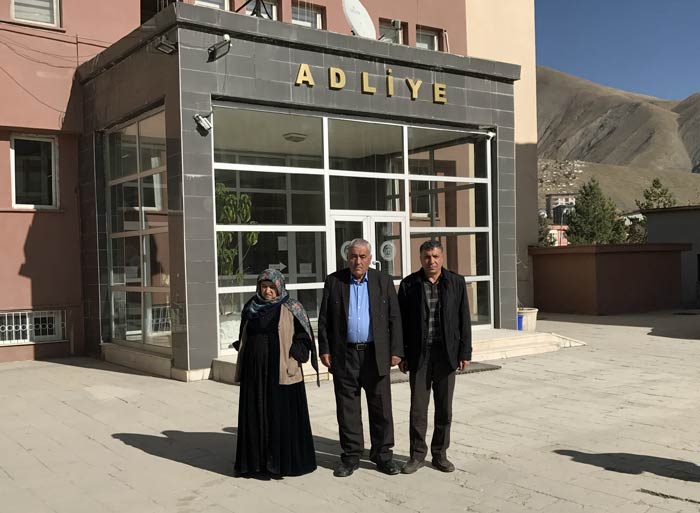
Nedim Türfent’s parents and Diyarbakır-based Free Journalist Society co-chair Hakkı Boltan (R) pose at the Hakkari Courthouse during the fourth hearing of the trial on Nov. 17, 2017 in Hakkari, Turkey. © Özgün Özçer
Fethi Balaman, who started covering the news in Yüksekova for Mezopotamya months after Türfent was detained, explained how his colleague’s work kept the authorities under scrutiny.
“He had a huge network and he could reach anywhere. That scared them. This is why he started to receive more and more threats,” he said. “For instance, they knew that if there was a raid somewhere, Nedim would be informed. What did they do then? They took him so they could do anything they wanted.”
Türfent, who answered our questions from prison through a lawyer, Deniz Yıldız, stressed that it was not just himself but all journalists in the region who were being subject to pressure – pressure that continues even in jail. “As journalists who work in the region, we continuously encounter the cold face of the state when we are outside of prison. The same practices are also reflected once inside.”
More than 200 ongoing cases
Indeed, though compelling, Türfent’s case is just one of many lawsuits against Kurdish journalists. More than 200 probes have been opened against regional journalists, according to Diyarbakır-based Free Journalist Society co-chair Hakkı Boltan.
One of them is Dihaber reporter Selman Keleş, who was detained for taking pictures of Van’s Municipality building after it was surrounded with concrete blocks. Dihaber reporter Mehmet Güleş was also recently sentenced to nine years for “being a member of a terrorist organization” and “conducting propaganda.” Güleş had irritated authorities by reporting about the army’s destruction of homes in his hometown of Şırnak.
Balaman explained that he sometimes has to pass three checkpoints to cover a routine news story. Reporters cannot use a camera anymore, as police and soldiers confiscate them whenever they see one. “When I use a camera, I think about protecting it before protecting myself.”
Türfent is asking for more public awareness and support for the many Kurdish journalists who work across the region. “Our colleagues in the west are confronted with trumped-up indictments. But they have the possibility of moulding public opinion. Journalists who work [here], especially in remote places such as Yüksekova and Cizre, remain in the background.”
The fate of such journalists is a litmus test for defenders of press freedom given the lack of public attention for their plight. “Many colleagues are still waiting for a trial to start two years [after they were detained]. However, there isn’t even a small news story about them,” Türfent said.
Through months of military siege and a state of emergency, local reporters have braved authorities to report on killings, destruction and atrocities that would have been concealed if not for the journalists’ work. But ultimately, the question goes beyond freedom of expression; now, it is the very essence of truth that is at stake.
“Understanding the causes and the results of the Nedim Türfent case means understanding the necessity of freedom for journalists,” said Boltan, demanding more support for Kurdish journalists. “The violations committed here are the source of the pressure on the mainstream media.”
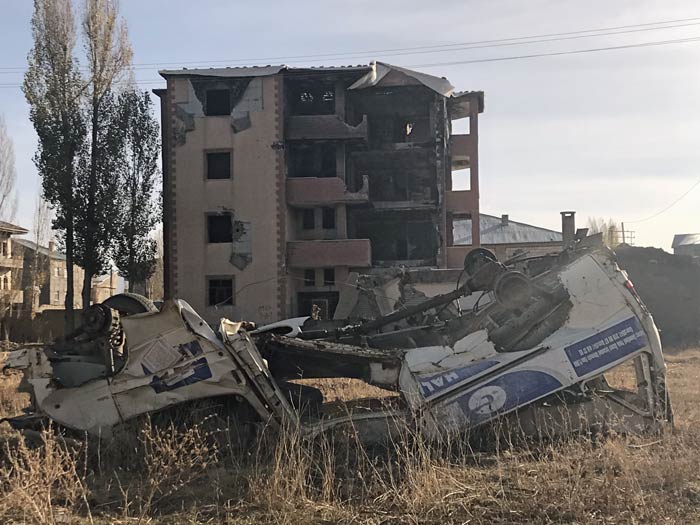
Destruction is still visible in some areas of Yüksekova more than a-year-and-a-half after the military siege. © Özgün Özçer
[/vc_column_text][/vc_column][/vc_row][vc_row][vc_column][vc_custom_heading text=”Mapping Media Freedom” use_theme_fonts=”yes”][vc_separator color=”black”][vc_row_inner][vc_column_inner width=”1/4″][vc_icon icon_fontawesome=”fa fa-times-circle” color=”black” background_style=”rounded” size=”xl” align=”right”][/vc_column_inner][vc_column_inner width=”3/4″][vc_column_text]
Since 24 May 2014, Mapping Media Freedom’s team of correspondents and partners have recorded and verified over 3,600 violations against journalists and media outlets.
Index campaigns to protect journalists and media freedom. You can help us by submitting reports to Mapping Media Freedom.[/vc_column_text][/vc_column_inner][/vc_row_inner][vc_separator color=”black”][/vc_column][/vc_row][vc_row][vc_column][vc_custom_heading text=”Don’t lose your voice. Stay informed.” use_theme_fonts=”yes”][vc_separator color=”black”][vc_row_inner][vc_column_inner width=”1/2″][vc_column_text]Index on Censorship is a nonprofit that campaigns for and defends free expression worldwide. We publish work by censored writers and artists, promote debate, and monitor threats to free speech. We believe that everyone should be free to express themselves without fear of harm or persecution – no matter what their views.
Join our mailing list (or follow us on Twitter or Facebook) and we’ll send you our weekly newsletter about our activities defending free speech. We won’t share your personal information with anyone outside Index.[/vc_column_text][/vc_column_inner][vc_column_inner width=”1/2″][gravityform id=”20″ title=”false” description=”false” ajax=”false”][/vc_column_inner][/vc_row_inner][vc_separator color=”black”][/vc_column][/vc_row]
19 Nov 17 | Bahrain, Bahrain Statements, Campaigns -- Featured, Statements
[vc_row][vc_column][vc_row_inner][vc_column_inner][vc_column_text]
Take Action!
Join a vigil to tell Bahrain to immediately and unconditionally release Nabeel Rajab.
[/vc_column_text][/vc_column_inner][/vc_row_inner][vc_column_text]

Bahraini human rights defender Nabeel Rajab (Photo: The Bahrain Institute for Rights and Democracy)
The trial of Bahrain’s most prominent human rights defender Nabeel Rajab was adjourned to 31 December for a technical report on his tweets.
Rajab faces up to 15 years in prison on charges related to his tweets exposing torture in a Bahraini prison and criticising the humanitarian cost of the war in Yemen. In September 2017, a new set of charges were brought against Rajab related to social media posts made in January 2017, when he was already in detention and without internet access. Rajab also faces a fourth set of charges related to a letter he penned to the New York Times in September 2016. In July 2017 he was sentenced to two years in prison for “spreading false news”, the appeal of which is expected to conclude on 22 November 2017.
The hearing was today adjourned to 31 December in order to hear from the expert who wrote the technical report. It is not expected to be the last hearing. The court brought back a forensic expert, who was asked about the IP address of Rajab’s Twitter account. The technical expert admitted to the court that he is unable to identify the IP Address, unless Twitter provides it.
The public prosecutor requested to call on the officer who confiscated Nabeel’s electronics devices for another case but will be examined for this case. This request was granted.
The forensic expert’s testimony did not last long. The court had another witness from the criminal investigation directorate (CID) who was not brought forward, though the reason for this was unclear. Rajab was bearded and in high spirits.
Sayed Ahmed Alwadaei, director of advocacy at the Bahrain Institute for Rights and Democracy, said: “Bahrain’s horrific rights record has hit a new level after being blacklisted by the UN for being part of the Saudi-led coalition in Yemen. Persecuting Nabeel for advocating peace is heinous crime added to the catalogue of abuses by Bahrain’s rulers, The continued; unethical support of the UK and the US to Bahrain fosters the culture of impunity.”
Rajab, the founder of President of the Bahrain Centre for Human Rights, was arrested on 13 June 2016 and has been detained ever since. He was held largely in solitary confinement in the first nine months of his detention, violating the UN Standard Minimum Rules for Non-Custodial Measures (Tokyo Rules) which state: “pre-trial detention shall be used as a means of last resort in criminal proceedings, with due regard for the investigation of the alleged offence and for the protection of society and the victim.”
In early April 2017, Rajab was admitted to the Bahrain Defence Force hospital for a necessary surgery. He was transferred back to police custody just a day later, before having recovered from his operation, and his health deteriorated significantly; from there he was transferred to the Ministry of Interior Clinic (Al-Qalaa), where he remains to date. Between April and August 2017, Rajab was unable to attend court, which held numerous hearings in his absence, including his sentencing. Rajab was transferred back to Jau Prison in October.
The UN Committee Against Torture has called for Rajab’s release.
In response to a parliamentary question, the UK Foreign Office Minister Lord Ahmad of Wimbledon, said: “We continue to closely monitor the case of Nabeel Rajab and have frequently raised it with the Bahraini Government at the highest levels. The UK Government continues to emphasise the need to respect the rights of all citizens, including freedom of expression.”
In the US, the Trump Administration this year removed Obama-era human rights conditions on arms sales, one of which was the unconditional release of Rajab. In September, the Trump Administration approved the sale of F-16 jets worth $3.8 billion.
[/vc_column_text][/vc_column][/vc_row][vc_row][vc_column][vc_basic_grid post_type=”post” max_items=”12″ style=”load-more” items_per_page=”4″ element_width=”6″ grid_id=”vc_gid:1511193063493-9006acc1-2369-5″ taxonomies=”3368, 716″][/vc_column][/vc_row]
16 Nov 17 | Artistic Freedom, Campaigns -- Featured, Equatorial Guinea, Statements
[vc_row][vc_column][vc_single_image image=”96393″ img_size=”full”][vc_column_text]Mr. Teodoro Obiang Nguema Mbasogo
President of the Republic of Equatorial Guinea
Palacio Presidencial
Avenida de la Libertad
Malabo, Guinea Ecuatorial
Your Excellency,
We write to express our deep concern in response to the unjust arrest and subsequent detention without charge of Ramón Esono Ebalé in Malabo on 16th September 2017, and to urge you to release him immediately.
Mr. Ebalé and two of his friends were stopped by police, handcuffed, and had their mobile phones seized while getting into Mr. Ebalé’s sister’s car after leaving a restaurant in Malabo. Police then interrogated Mr. Ebalé about his drawings of, and blog posts about members of the Equatoguinean leadership, and told him – in front of his two friends – that he needed to make a statement explaining those drawings and blog posts. It was confirmed by police that only Mr. Ebalé was the target of the arrest, and not his two friends.
Mr Ebalé has learned that he faces potential charges of counterfeiting and money laundering; offences that were apparently never mentioned to him or his friends when they were arrested. Mr. Ebalé’s prolonged detention without charge gives rise to serious concerns that these allegations are no more than a pretext to justify the ongoing arbitrary deprivation of liberty he is being subjected to.
Mr. Ebalé’s extended detention at Black Beach prison without charge appears to be a clear violation of Equatorial Guinean law, which requires charges to be filed within 72 hours of an arrest. A judge has not mandated preventative detention in his case, which under exceptional circumstances would allow the police to hold him without charge for longer, nor does there appear to be a basis for such an order.
Mr. Ebalé, a renowned cartoonist who has been living abroad since 2011, has now spent 60 days in prison. His arrest in Equatorial Guinea—where he returned to renew his passport—has received global attention with calls for his release from fellow journalists, artists, activists, and human rights and press freedom organizations.
As Equatorial Guinea prepares to join the UN Security Council in January 2018, the world is watching the case of Mr. Ebalé closely. We hope that as your country takes this prominent position on the world stage, your government respects all human rights, including the right to freedom of expression, as enshrined in Article 19 of the Universal Declaration of Human Rights.
In this vein, we call on your Excellency, and the judicial authorities in Equatorial Guinea to respect the rights of all artists, human rights defenders, activists, and, more generally, all individuals in Equatorial Guinea who wish to exercise their right to freedom of expression, peaceful assembly and association without fear of being harassed or prosecuted.
To this end, we urge you to order Mr. Ebalé’s immediate and unconditional release from prison.
Thank you for your consideration.
Yours Sincerely,
Amnesty International
API Madrid
Arterial Network
Association of American Editorial Cartoonists
Baroness Helena Kennedy QC, Member of the House of Lords, President of JUSTICE
Cartoonist Rights Network International
Committee to Protect Journalists
EG Justice
International Federation for Human Rights (FIDH), within the framework of the Observatory for the Protection of Human Rights Defenders
Freemuse
Human Rights Watch
Index on Censorship
PEN International
Reporters Without Borders
The Doughty Street International Media Defense Panel
Transparency International
UNCAC Coalition
World Organisation Against Torture (OMCT), within the framework of the Observatory for the
Protection of Human Rights Defenders[/vc_column_text][vc_video link=”https://youtu.be/DD3aNb2GTj8″][/vc_column][/vc_row][vc_row][vc_column][vc_custom_heading text=”Don’t lose your voice. Stay informed.” use_theme_fonts=”yes”][vc_separator color=”black”][vc_row_inner][vc_column_inner width=”1/2″][vc_column_text]Index on Censorship is a nonprofit that campaigns for and defends free expression worldwide. We publish work by censored writers and artists, promote debate, and monitor threats to free speech. We believe that everyone should be free to express themselves without fear of harm or persecution – no matter what their views.
Join our mailing list (or follow us on Twitter or Facebook) and we’ll send you our weekly newsletter about our activities defending free speech. We won’t share your personal information with anyone outside Index.[/vc_column_text][/vc_column_inner][vc_column_inner width=”1/2″][gravityform id=”20″ title=”false” description=”false” ajax=”false”][/vc_column_inner][/vc_row_inner][vc_separator color=”black”][/vc_column][/vc_row]
13 Nov 17 | Europe and Central Asia, Mapping Media Freedom, Media Freedom, media freedom featured, News and features, Turkey
[vc_row][vc_column][vc_column_text]
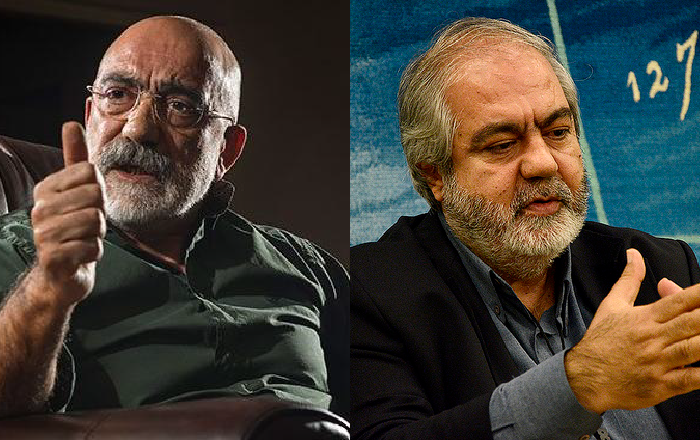
Brothers Ahmet Altan and Mehmet Altan
Turkish journalists Ahmet Altan and Mehmet Altan’s defence attorneys were forced to leave the courtroom as their clients stood trial Monday 13 November, accused of taking part in Turkey’s failed 2016 coup. Both brothers are prominent Turkish journalists, known for their critical reporting on president Erdogan’s regime.
Ahmet and Mehmet Altan, along with Nazlı Ilıcak, also face three aggravated life sentences for supposedly committing crimes on behalf of the Gulen movement, considered a terrorist organisation after the failed coup.
The lawyers were ordered to leave on the grounds that they were speaking without permission, according to Bianet. They were prevented from making a statement of defence, at which point they were removed from the courtroom. “This incident displays the intolerance towards the defence. We’ve been taken out of the courtroom for attempting to exercise the right of defence,” lawyer Ergin Cinmen told Bianet.
“The persecution of journalists and disregard for the rule of law continues on a shocking scale in Turkey,” said Joy Hyvarinen, acting head of advocacy at Index on Censorship. “We urge the Turkish authorities to reconsider.”
Without lawyers present, the court then ruled that the Altan brothers — along with four other journalists — will remain in pretrial detention. The hearings will resume on 11 December.
[/vc_column_text][/vc_column][/vc_row][vc_row][vc_column][vc_basic_grid post_type=”post” max_items=”4″ element_width=”6″ grid_id=”vc_gid:1510592796287-71bfb911-aff6-5″ taxonomies=”55″][/vc_column][/vc_row]
10 Nov 17 | Campaigns -- Featured, Europe and Central Asia, Turkey, Turkey Letters
[vc_row][vc_column][vc_column_text]
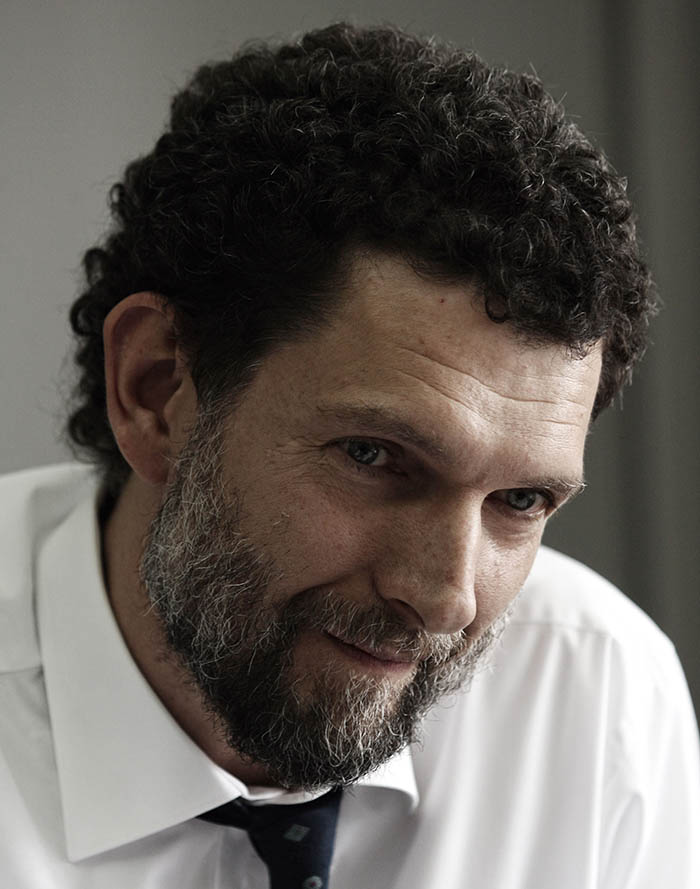
Osman Kavala. Credit: Anadolu Kültür
We, the undersigned representatives of Time to Talk debate centres from across Europe, were shocked to learn about the detention of Osman Kavala, the chairperson of Anadolu Kültür and the founder of our fellow Time to Talk member, DEPO Istanbul.
Osman Kavala is a key figure within Turkish culture and civil society, a committed European and democrat and a central figure who inspires and enables cultural exchange throughout Turkey and with other European countries. Collaborating with some of the important cultural organisations that he has founded in Turkey, we have witnessed the power of his commitment to democracy, pluralism, freedom of speech, peace and human rights as well as his devotion to intercultural dialogue, cultural heritage and the arts.
On the 18th October 2017, Osman Kavala was detained. On November 1st, after 14 days in custody, he was charged with having ties to terrorist organisations and with attempting to overthrow the constitutional order in Turkey. According to Turkish media reports, he is accused of being the “leader and organiser” of the Gezi protests as well as of having had contact with a U.S.-based expert on Turkey, who the Turkish state appears to believe to have been amongst those behind plotting the coup attempt of summer 2016.
Such accusations are entirely absurd and grotesque. We urge European media and politicians to follow the Osman Kavala case closely and to request full transparency in its processing. We insist on and hope to see a prompt release of Osman Kavala by the Turkish authorities – for the sake of Turkey and its people.
Dessy Gavrilova, Founder and Executive Chair
European Network of Houses for Debate, Time to Talk, Vienna
Marta Šimečkova, Director
Central European Forum, Bratislava
Judit Carrera, Head of Debates Programme
Elisabet Gaula, Debates Coordinator
Centre for Contemporary Culture (CCCB), Barcelona
Borka Pavićević, Director
Centre for Cultural Decontamination, Belgrade
Yoeri Albrecht, Director
De Balie, Amsterdam
Sabine Beppler- Spahl, Chair of the Board
Freiblickinstitut e. V., Berlin
Rachael Jolley, Editor
Index on Censorship, London
Claire Fox, Director
Institute of Ideas, London
The team
Krytyka Polityczna, Warsaw
The team
Kultura Liberalna, Warsaw
Kristina Hristova, Executive Director
The Red House Centre for Culture and Debate, Sofia
Sergey Lukashevsky, Director
Sakharov Centre, Moscow
and Member
Moscow Helsinki Group, Moscow
Vasyl Cherepanyn, Head
Visual Culture Research Centre, Kyiv[/vc_column_text][/vc_column][/vc_row][vc_row][vc_column][vc_basic_grid post_type=”post” max_items=”4″ element_width=”6″ grid_id=”vc_gid:1510242474854-81957f7a-c6c6-5″ taxonomies=”55″][/vc_column][/vc_row]
10 Nov 17 | Europe and Central Asia, News and features, Turkey, Turkey Uncensored
[vc_row][vc_column][vc_column_text]

Osman Kavala. Credit: Anadolu Kültür
On 19 October, when police officers detained Osman Kavala, a left-wing Turkish human rights activist and businessman who funds a variety of cultural and civil society activities, I was set to catch a plane en route to Armenia to attend a conference. The news was extremely bothersome as I, having held a civil society job for two years, knew all too well what his detention entailed. As Andrew Finkel, an executive of the Independent Platform for Journalism (P24) commented, his detention and later arrest was “a chilling signal to those working in the civil society community”.
I never knew Kavala personally, but always respected him for allowing civil society organisations to use his centrally-located Cezayir Restaurant for events and gatherings, usually at a minimal charge. I tried not to think about what I understood to be a new low in Turkey’s recent descent into authoritarianism and had managed to completely forget about it by the time I had reached the beautiful mountain resort of Arghevan. Yet my fellow conference attendees were quick to remind me of what had happened at home earlier in the day. Several people greeted me saying they had heard the news; that they were extremely concerned about their friend Osman. “He has more friends in Armenia than he has in Turkey,” Armen Ohanyan, an Armenian writer, told me.
This, of course, owes to Kavala’s commitment to Turkish-Armenian reconciliation. He has been committed to improving the troubled relations between the two neighbours stemming from a number of factors, but mainly from Turkey’s unwillingness to recognise the Armenian Genocide. However, repairing ties was not the only area where Kavala worked. Anadolu Kültür, a foundation he established, has carried out many cultural projects including restoration of minority heritage. He has also been an active supporter of children’s, women’s and LGBT rights. The foundation was recently involved in a project for integrating Syrian refugees into Turkish society.
Dozens of articles from his friends followed his arrest and from them we learn that, unlike most of Turkey’s elite, this wealthy businessman not only talked about the most problematic affairs of his country but actively put time and effort into resolving them. He remained committed to pursuing that goal until it was too much for the government. Perhaps he was not a saint or some modern-day sage who devoted his life to others, but he was a good man; a “good citizen” as the son-in-law of a general, who was imprisoned in a past crackdown led by prosecutors who were part of the Fethullah Gülen network which today the Turkish government accuses of being behind the 2016 coup attempt, called him.
Ironically, Kavala was arrested two weeks after his detention by an Istanbul court on the basis of a prosecutor’s allegation that he was linked with the “parallel structure” FETÖ/PDY — or the Fethullahist Terrorist Organisation — the name Turkish authorities give to Gülen network.
The prosecution accuses Kavala of “attempting to overthrow the government” by supporting Turkey’s Gezi Park protests — massive peaceful anti-government demonstrations that took place in all provinces across the country four years ago. His arrest was not a surprise and president Erdogan called Kavala an “agent” and the “Soros of Turkey” in the few hours following his initial detention.
In a statement he made while in prison on 6 November 2017, Kavala said it was Erdogan’s statements that led to his arrest. “My arrest is part of the government’s attack on all opposition,” he told a visiting deputy.
The charges against him are bogus, as Sedat Ergin, the former editor-in-chief of the Hürriyet daily, explained at length in a column which was translated into English. On 9 November, prominent European diplomats and politicians, including Carl Bildt, Claus Offe and others, wrote to the Financial Times, of the ridiculousness of the charges against him.
Whether there will be an unexpected yet helpful twist in the course of his proceedings as was the case of the eight human rights defenders who were released conditionally have yet to be seen. However, his treatment so far clearly shows that darker times are ahead for civil society.
On 8 November the Checks and Balances Network (DDA), an umbrella network for more than 100 civil society organisations, made a timid statement denouncing reports labeling it as a supporter of foreign agents, following news stories in the pro-government media which stated that the National Endowment for Democracy (NED) funded network is an arm of the CIA. Other civil society organisations that are involved in non-political activities are also extremely concerned.
What makes Kavala’s arrest so pervasive is that it sends the message that the government has not been satisfied by the level of the crackdown it has already imposed on civil society. A total of 1,125 associations and 41 foundations were shut down under cabinet decrees since the declaration of the post-coup attempt state of emergency. Civil society leaders, who might have spoken out on Kavala’s arrest or not, now understand that Erdoğan may resort to Putin-like measures, banning civil society activities entirely and labelling its representatives as “foreign agents”.
That fear echoed in the initial remarks of Kavala’s academic and activist wife Ayşe Buğra, who said in a statement she made after her husband’s arrest: ““With the arrest ruling we have not only lost Osman Kavala’s freedom but at the same time our hopes in democracy, peace and the rule of law.”[/vc_column_text][/vc_column][/vc_row][vc_row][vc_column][vc_basic_grid post_type=”post” max_items=”4″ element_width=”6″ grid_id=”vc_gid:1510241893657-0016a8b6-b819-2″ taxonomies=”7355″][/vc_column][/vc_row]
09 Nov 17 | Awards, Awards year slider
[vc_row full_width=”stretch_row_content_no_spaces” css_animation=”fadeIn” css=”.vc_custom_1500380806420{padding-top: 250px !important;padding-bottom: 250px !important;background-image: url(https://www.indexoncensorship.org/newsite02may/wp-content/uploads/2017/07/logo-2018-1460×490.jpg?id=94317) !important;background-position: center !important;background-repeat: no-repeat !important;background-size: cover !important;}”][vc_column][/vc_column][/vc_row][vc_row full_width=”stretch_row” css=”.vc_custom_1500449679881{margin-top: -50px !important;}”][vc_column][vc_custom_heading text=”2018 FREEDOM OF EXPRESSION AWARDS” font_container=”tag:h1|text_align:center” use_theme_fonts=”yes”][vc_row_inner disable_element=”yes”][vc_column_inner][vc_empty_space height=”15px”][vc_custom_heading text=”ABOUT THE AWARDS” font_container=”tag:h2|text_align:center” use_theme_fonts=”yes”][/vc_column_inner][/vc_row_inner][vc_row_inner equal_height=”yes” content_placement=”middle”][vc_column_inner el_class=”awards-inside-desc” width=”1/2″][vc_column_text]Index on Censorship’s Freedom of Expression Awards exist to celebrate individuals or groups who have had a significant impact fighting censorship anywhere in the world.
- Awards are offered in four categories: Arts, Campaigning, Digital Activism and Journalism
- Anyone who has had a demonstrable impact in tackling censorship is eligible
- Winners are honoured at a gala celebration in London
- Winners join Index’s Awards Fellowship programme and receive dedicated training and support
[/vc_column_text][/vc_column_inner][vc_column_inner width=”1/2″][vc_video link=”https://youtu.be/a9Yl-nkwpig”][/vc_column_inner][/vc_row_inner][/vc_column][/vc_row][vc_row full_width=”stretch_row”][vc_column][vc_custom_heading text=”2018 Fellowship” font_container=”tag:h3|text_align:center” use_theme_fonts=”yes”][vc_column_text]
Selected from over 400 public nominations and a shortlist of 16, the 2018 Freedom of Expression Awards Fellows exemplify courage in the face of censorship. Learn more about the fellowship.
[/vc_column_text][vc_row_inner][vc_column_inner width=”1/2″][vc_single_image image=”97994″ img_size=”full”][vc_column_text]Arts | The Museum of Dissidence
The Museum of Dissidence is a public art project and website celebrating dissent in Cuba. Set up in 2016 by acclaimed artist Luis Manuel Otero Alcántara and curator Yanelys Nuñez Leyva, their aim is to reclaim the word “dissident” and give it a positive meaning in Cuba. The museum organises radical public art projects and installations, concentrated in the poorer districts of Havana. Their fearlessness in opening dialogues and inhabiting public space has led to fierce repercussions: Nuñez was sacked from her job and Otero arrested and threatened with prison for being a “counter-revolutionary.” Despite this, they persist in challenging Cuba’s restrictions on expression.
Full profile | Speech[/vc_column_text][/vc_column_inner][vc_column_inner width=”1/2″][vc_single_image image=”97988″ img_size=”full”][vc_column_text]Campaigning | Egyptian Commission for Rights and Freedoms
The Egyptian Commission for Rights and Freedoms is one of the few human rights organisations still operating in a country which has waged an orchestrated campaign against independent civil society groups. Egypt is becoming increasingly hostile to dissent, but ECRF continues to provide advocacy, legal support and campaign coordination, drawing attention to the many ongoing human rights abuses under the autocratic rule of President Abdel Fattah-el-Sisi. Their work has seen them subject to state harassment, their headquarters have been raided and staff members arrested. ECRF are committed to carrying on with their work regardless of the challenges.
Full profile | Speech[/vc_column_text][/vc_column_inner][/vc_row_inner][vc_row_inner][vc_column_inner width=”1/2″][vc_single_image image=”97990″ img_size=”full”][vc_column_text]Digital Activism | Habari RDC
Launched in 2016, Habari RDC is a collective of more than 100 young Congolese bloggers and web activists, who use Facebook, Twitter and YouTube to give voice to the opinions of young people from all over the Democratic Republic of Congo. Their site posts stories and cartoons about politics, but it also covers football, the arts and subjects such as domestic violence, child exploitation, the female orgasm and sexual harassment at work. Habari RDC offers a distinctive collection of funny, angry and modern Congolese voices, who are demanding to be heard.
Full profile | Speech[/vc_column_text][/vc_column_inner][vc_column_inner width=”1/2″][vc_single_image image=”98000″ img_size=”full”][vc_column_text]Journalism | Wendy Funes
Wendy Funes is an investigative journalist from Honduras who regularly risks her life for her right to report on what is happening in the country, an extremely harsh environment for reporters. Two journalists were murdered in 2017 and her father and friends are among those who have met violent deaths in the country – killings for which no one has ever been brought to justice. Funes meets these challenges with creativity and determination. For one article she had her own death certificate issued to highlight corruption. Funes also writes about violence against women, a huge problem in Honduras where one woman is killed every 16 hours.
Full profile | Speech[/vc_column_text][/vc_column_inner][/vc_row_inner][awards_gallery_slider name=”2018 AWARDS GALA” images_url=”99875,99880,99879,99881,99882,99884,99885,99886,99887,99888,99889,99890,99891,99892,99893,99902,99906,99907,99908,99909,99910,99911,99912,99913,99914,99915,99916,99917,99918,99919,99920,99921,99922,99923,99924,99926,99925″][vc_column_text]
The Awards were held at London’s May Fair Hotel on Thursday 19 April 2018.
High-resolution images are available for download via Flickr.
[/vc_column_text][vc_custom_heading text=”THE 2018 FELLOWSHIP SHORTLIST” font_container=”tag:h2|text_align:center” use_theme_fonts=”yes”][vc_tta_tabs][vc_tta_section title=”Arts” tab_id=”Arts”][vc_row_inner][vc_column_inner width=”1/2″][vc_column_text]
ARTS
for artists and arts producers whose work challenges repression and injustice and celebrates artistic free expression
[/vc_column_text][/vc_column_inner][vc_column_inner width=”1/2″][vc_video link=”https://www.youtube.com/watch?v=VfntVe_SrPY”][/vc_column_inner][/vc_row_inner][vc_row_inner][vc_column_inner width=”1/4″][vc_single_image image=”97991″ onclick=”custom_link” link=”https://www.indexoncensorship.org/newsite02may/2018/03/indexawards-2018-jamal-alis-music-fights-oppression-in-azerbaijan/”][vc_column_text]Jamal Ali, Azerbaijan[/vc_column_text][/vc_column_inner][vc_column_inner width=”1/4″][vc_single_image image=”97998″ onclick=”custom_link” link=”https://www.indexoncensorship.org/newsite02may/2018/03/index-awards-silvanos-mudzvova/”][vc_column_text]Silvanos Mudzvova, Zimbabwe[/vc_column_text][/vc_column_inner][vc_column_inner width=”1/4″][vc_single_image image=”99853″ onclick=”custom_link” link=”https://www.indexoncensorship.org/newsite02may/2018/03/indexawards2017-museum-of-dissidence-cuba-activism/”][vc_column_text]The Museum of Dissidence, Cuba[/vc_column_text][/vc_column_inner][vc_column_inner width=”1/4″][vc_single_image image=”97985″ onclick=”custom_link” link=”https://www.indexoncensorship.org/newsite02may/2018/03/index-awards-abbad-yahya/”][vc_column_text]Abbad Yahya, Palestine[/vc_column_text][/vc_column_inner][/vc_row_inner][/vc_tta_section][vc_tta_section title=”Campaigning” tab_id=”1524476396272-7b8a9fcb-bce7″][vc_row_inner][vc_column_inner width=”1/2″][vc_column_text]
CAMPAIGNING
for activists and campaigners who have had a marked impact in fighting censorship and promoting freedom of expression
Supported by Doughty Street Chambers
[/vc_column_text][/vc_column_inner][vc_column_inner width=”1/2″][vc_video link=”https://www.youtube.com/watch?v=iV2qFGmPhUU”][/vc_column_inner][/vc_row_inner][vc_row_inner][vc_column_inner width=”1/4″][vc_single_image image=”99421″ onclick=”custom_link” link=”https://www.indexoncensorship.org/newsite02may/2018/03/indexawards2018-ecrf-advocates-for-democratic-egypt/”][vc_column_text]Egyptian Commission for Rights and Freedoms, Egypt[/vc_column_text][/vc_column_inner][vc_column_inner width=”1/4″][vc_single_image image=”97995″ onclick=”custom_link” link=”https://www.indexoncensorship.org/newsite02may/2018/03/index-awards-nglhrc/”][vc_column_text]National Gay and Lesbian Human Rights Commission, Kenya[/vc_column_text][/vc_column_inner][vc_column_inner width=”1/4″][vc_single_image image=”97997″ onclick=”custom_link” link=”https://www.indexoncensorship.org/newsite02may/2018/03/index-awards-open-stadiums/”][vc_column_text]Open Stadiums, Iran[/vc_column_text][/vc_column_inner][vc_column_inner width=”1/4″][vc_single_image image=”97999″ onclick=”custom_link” link=”https://www.indexoncensorship.org/newsite02may/2018/03/index-awards-team-29/”][vc_column_text]Team 29, Russia[/vc_column_text][/vc_column_inner][/vc_row_inner][/vc_tta_section][vc_tta_section title=”Digital activism” tab_id=”1524476516614-1a2ebb46-7ed2″][vc_row_inner][vc_column_inner width=”1/2″][vc_column_text]
DIGITAL ACTIVISM
for innovative uses of technology to circumvent censorship and enable free and independent exchange of information
Supported by Private Internet Access
[/vc_column_text][/vc_column_inner][vc_column_inner width=”1/2″][vc_video link=”https://www.youtube.com/watch?v=dz0rqQOlutw”][/vc_column_inner][/vc_row_inner][vc_row_inner][vc_column_inner width=”1/4″][vc_single_image image=”97987″ onclick=”custom_link” link=”https://www.indexoncensorship.org/newsite02may/2018/04/index-awards-digital-rights-foundation/”][vc_column_text]Digital Rights Foundation, Pakistan[/vc_column_text][/vc_column_inner][vc_column_inner width=”1/4″][vc_single_image image=”97989″ onclick=”custom_link” link=”https://www.indexoncensorship.org/newsite02may/2018/04/index-awards-fereshteh-forough/”][vc_column_text]Fereshteh Forough, Afghanistan[/vc_column_text][/vc_column_inner][vc_column_inner width=”1/4″][vc_single_image image=”99851″ onclick=”custom_link” link=”https://www.indexoncensorship.org/newsite02may/2018/04/index-awards-habari-rdc-digital-activism/”][vc_column_text]Habari RDC, Congo[/vc_column_text][/vc_column_inner][vc_column_inner width=”1/4″][vc_single_image image=”97992″ onclick=”custom_link” link=”https://www.indexoncensorship.org/newsite02may/2018/04/index-awards-media-cat-free-speech/”][vc_column_text]Mèdia.cat, Spain[/vc_column_text][/vc_column_inner][/vc_row_inner][/vc_tta_section][vc_tta_section title=”Journalism” tab_id=”1524476563543-4fdf3da9-962c”][vc_row_inner][vc_column_inner width=”1/2″][vc_column_text]
JOURNALISM
for courageous, high-impact and determined journalism that exposes censorship and threats to free expression
Sponsored by Vice News
[/vc_column_text][/vc_column_inner][vc_column_inner width=”1/2″][vc_video link=”https://www.youtube.com/watch?v=i8KfzAtARGQ”][/vc_column_inner][/vc_row_inner][vc_row_inner][vc_column_inner width=”1/4″][vc_single_image image=”97986″ onclick=”custom_link” link=”https://www.indexoncensorship.org/newsite02may/2018/04/index-awards-avispa-midia/”][vc_column_text]Avispa Midia, Mexico[/vc_column_text][/vc_column_inner][vc_column_inner width=”1/4″][vc_single_image image=”99850″ onclick=”custom_link” link=”https://www.indexoncensorship.org/newsite02may/2018/04/index-awards-wendy-funes/”][vc_column_text]Wendy Funes, Honduras[/vc_column_text][/vc_column_inner][vc_column_inner width=”1/4″][vc_single_image image=”97993″ onclick=”custom_link” link=”https://www.indexoncensorship.org/newsite02may/2018/04/index-awards-muck-rock/”][vc_column_text]MuckRock, United States[/vc_column_text][/vc_column_inner][vc_column_inner width=”1/4″][vc_single_image image=”97996″ onclick=”custom_link” link=”https://www.indexoncensorship.org/newsite02may/2018/04/novosti-combats-croatian-natinalism/”][vc_column_text]Novosti, Croatia[/vc_column_text][/vc_column_inner][/vc_row_inner][/vc_tta_section][/vc_tta_tabs][/vc_column][/vc_row][vc_row full_width=”stretch_row” css=”.vc_custom_1484569093244{background-color: #f2f2f2 !important;}”][vc_column][vc_custom_heading text=”JUDGING” font_container=”tag:h1|text_align:center” use_theme_fonts=”yes”][vc_row_inner el_class=”mw700″][vc_column_inner][vc_column_text]
Each year Index recruits an independent panel of judges – leading voices with diverse expertise across campaigning, journalism, the arts and human rights. Judges look for courage, creativity and resilience. We shortlist on the basis of those who are deemed to be making the greatest impact in tackling censorship in their chosen area, with a particular focus on topics that are little covered or tackled by others. Where a judge comes from a nominee’s country, or where there is any other potential conflict of interest, the judge will abstain from voting in that category.
The 2018 judging panel:
[/vc_column_text][/vc_column_inner][/vc_row_inner][vc_row_inner][vc_column_inner width=”1/4″][staff name=”Razia Iqbal” title=”Journalist” profile_image=”97201″]Razia Iqbal is a presenter for BBC News, where she is one of the main presenters of Newshour, the flagship news and current affairs programme on BBC World Service radio. [/staff][/vc_column_inner][vc_column_inner width=”1/4″][staff name=”Tim Moloney QC” title=”Barrister” profile_image=”97202″]Tim Moloney QC is the deputy head of Doughty Street Chambers. His practice encompasses crime, extradition, international criminal law, international death penalty litigation, public law and media law. [/staff][/vc_column_inner][vc_column_inner width=”1/4″][staff name=”Yana Peel” title=”Chief Executive” profile_image=”97203″]Yana Peel is CEO of the Serpentine Galleries, London, one of the most recognised organisations in the global contemporary art, design and architecture worlds. [/staff][/vc_column_inner][vc_column_inner width=”1/4″][staff name=”Eben Upton CBE” title=”Tech entrepreneur” profile_image=”97204″]Eben Upton CBE is a founder of the Raspberry Pi Foundation and serves as the CEO of Raspberry Pi (Trading), its commercial and engineering subsidiary.[/staff][/vc_column_inner][/vc_row_inner][/vc_column][/vc_row][vc_row full_width=”stretch_row” css=”.vc_custom_1510244917017{margin-top: 30px !important;}”][vc_column][vc_custom_heading text=”THE FREEDOM OF EXPRESSION AWARDS FELLOWSHIP” font_container=”tag:h2|text_align:center” use_theme_fonts=”yes” link=”url:https%3A%2F%2Fwww.indexoncensorship.org%2Fnewsite02may%2F2017%2F07%2F2018-freedom-of-expression-awards-fellowship%2F|||”][vc_column_text]
The Freedom of Expression Awards Fellowship is open to any individual or organisation involved in tackling free expression threats – either through journalism, campaigning, the arts or using digital techniques – is eligible for nomination. Any individual, group or NGO can nominate or self-nominate. There is no cost to apply. Nominees must have had a recognisable impact in the past 12 months.
We offer Fellowships in four categories:[/vc_column_text][vc_row_inner equal_height=”yes” disable_element=”yes” el_class=”awards-4grid” css=”.vc_custom_1524481168193{margin-top: 20px !important;margin-bottom: 20px !important;}”][vc_column_inner width=”1/4″ css=”.vc_custom_1500449830213{background-color: #cb3000 !important;}”][vc_custom_heading text=”Arts” use_theme_fonts=”yes”][vc_column_text]for artists and arts producers whose work challenges repression and injustice and celebrates artistic free expression[/vc_column_text][/vc_column_inner][vc_column_inner width=”1/4″ css=”.vc_custom_1500449924825{background-color: #d98c00 !important;}”][vc_custom_heading text=”Campaigning” use_theme_fonts=”yes”][vc_column_text]for activists and campaigners who have had a marked impact in fighting censorship and promoting freedom of expression[/vc_column_text][/vc_column_inner][vc_column_inner width=”1/4″ css=”.vc_custom_1500449960164{background-color: #cb3000 !important;}”][vc_custom_heading text=”Digital Activism” use_theme_fonts=”yes”][vc_column_text]for innovative uses of technology to circumvent censorship and enable free and independent exchange of information[/vc_column_text][/vc_column_inner][vc_column_inner width=”1/4″ css=”.vc_custom_1500449938665{background-color: #d98c00 !important;}”][vc_custom_heading text=”Journalism” use_theme_fonts=”yes”][vc_column_text]for courageous, high-impact and determined journalism that exposes censorship and threats to free expression[/vc_column_text][/vc_column_inner][/vc_row_inner][/vc_column][/vc_row][vc_row equal_height=”yes” el_class=”text_white” css=”.vc_custom_1500380887889{margin-top: 20px !important;margin-bottom: 20px !important;background-color: #cb3000 !important;}”][vc_column width=”1/2″][vc_custom_heading text=”Support the Index Awards.” font_container=”tag:p|font_size:28|text_align:center” use_theme_fonts=”yes” link=”url:https%3A%2F%2Fwww.indexoncensorship.org%2Fnewsite02may%2Fsupport-the-freedom-of-expression-awards%2F|||”][vc_column_text]
By donating to the Freedom of Expression Awards you help us support individuals and groups at the forefront of tackling censorship.
Find out more
[/vc_column_text][/vc_column][vc_column width=”1/2″ css=”.vc_custom_1524481080226{background-image: url(https://www.indexoncensorship.org/newsite02may/wp-content/uploads/2018/04/2018-Fellows-4-web.jpg?id=99811) !important;background-position: center !important;background-repeat: no-repeat !important;background-size: contain !important;}”][/vc_column][/vc_row][vc_row disable_element=”yes”][vc_column][vc_custom_heading text=”GALA” font_container=”tag:h1|text_align:center” use_theme_fonts=”yes”][awards_gallery_slider name=”2017 Freedom of Expression Awards” images_url=”89583,89582,89581,89580,89579,89577,89578,89576,89575,89574,89565,89560,89559,89553,89552,89551,89550,89549,89548,89547,89546,89545,89544,89543,89542,89541,89540,89539,89538,89537,89536,89535,89534,89533,89532,89531,89530,89529,89528,89527,89526,89525,89524,89523,89522,89520,89521,89519,89518,89517,89516,89515,89514,89513,89512,89511,89510,89509″][vc_column_text]
The Awards were held at London’s Unicorn Theatre on Wednesday 19 April 2017.
[/vc_column_text][/vc_column][/vc_row][vc_row full_width=”stretch_row_content_no_spaces” disable_element=”yes” css=”.vc_custom_1500384168164{margin-top: 20px !important;margin-bottom: 20px !important;padding-top: 20px !important;padding-right: 15px !important;padding-bottom: 20px !important;padding-left: 15px !important;background-color: #f2f2f2 !important;}”][vc_column][vc_row_inner content_placement=”middle” el_class=”container container980″][vc_column_inner][awards_news_slider name=”NEWS” years=”2017″][/vc_column_inner][/vc_row_inner][/vc_column][/vc_row][vc_row full_width=”stretch_row_content_no_spaces” css=”.vc_custom_1500453384143{margin-top: 20px !important;padding-top: 20px !important;padding-bottom: 20px !important;}”][vc_column][vc_row_inner][vc_column_inner][vc_custom_heading text=”SPONSORS” font_container=”tag:h1|text_align:center” use_theme_fonts=”yes” css=”.vc_custom_1484567001197{margin-bottom: 30px !important;}”][vc_column_text]
The Freedom of Expression Awards and Fellowship have massive impact. You can help by sponsoring or supporting a fellowship.
Index is grateful to those who are supporting the 2018 Awards:
[/vc_column_text][/vc_column_inner][/vc_row_inner][vc_row_inner equal_height=”yes” el_class=”container container980″][vc_column_inner width=”1/2″ offset=”vc_col-xs-6″][vc_single_image image=”80918″ img_size=”234×234″ alignment=”center” onclick=”custom_link” img_link_target=”_blank” link=”https://uk.sagepub.com/”][vc_single_image image=”85983″ img_size=”234×234″ alignment=”center” onclick=”custom_link” link=”https://www.privateinternetaccess.com/”][/vc_column_inner][vc_column_inner width=”1/2″ offset=”vc_col-xs-6″][vc_single_image image=”80921″ img_size=”234×234″ alignment=”center” onclick=”custom_link” img_link_target=”_blank” link=”https://www.google.co.uk/about/”][vc_single_image image=”85977″ img_size=”150×150″ alignment=”center” onclick=”custom_link” link=”http://www.edwardian.com/”][/vc_column_inner][/vc_row_inner][vc_row_inner equal_height=”yes” el_class=”container container980″][vc_column_inner width=”1/3″ offset=”vc_col-xs-6″][vc_single_image image=”82003″ alignment=”center” onclick=”custom_link” img_link_target=”_blank” link=”http://www.vodafone.com/content/index.html#”][/vc_column_inner][vc_column_inner width=”1/3″ offset=”vc_col-xs-6″][vc_single_image image=”82323″ alignment=”center” onclick=”custom_link” link=”https://news.vice.com/”][/vc_column_inner][vc_column_inner width=”1/3″ offset=”vc_col-xs-6″][vc_single_image image=”80923″ img_size=”medium” alignment=”center” onclick=”custom_link” img_link_target=”_blank” link=”http://www.doughtystreet.co.uk/”][/vc_column_inner][/vc_row_inner][vc_row_inner equal_height=”yes” el_class=”container container980″][vc_column_inner width=”1/3″ offset=”vc_col-xs-6″][/vc_column_inner][vc_column_inner width=”1/3″ offset=”vc_col-xs-6″][vc_single_image image=”80924″ alignment=”center” onclick=”custom_link” img_link_target=”_blank” link=”https://psiphon.ca/”][/vc_column_inner][vc_column_inner width=”1/3″ offset=”vc_col-xs-6″][/vc_column_inner][/vc_row_inner][vc_column_text]
If you are interested in sponsorship you can contact [email protected]
[/vc_column_text][/vc_column][/vc_row]
09 Nov 17 | Asia and Pacific, Awards, China, Europe and Central Asia, Fellowship, Fellowship 2017, Maldives, News and features, Russia, Turkey
[vc_row][vc_column][vc_column_text]
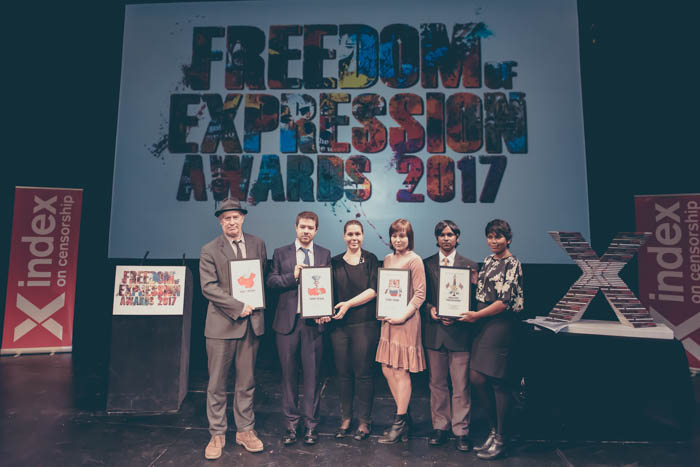
From left: Cartoonist Martin Rowson accepting the Arts Award on behalf of Chinese cartoonist Rebel Pepper; Alp Toker of Digital Activism Award-winner Turkey Blocks; Isik Mater of Digital Activism Award-winner Turkey Blocks; Anastasia Zotova, wife and campaign partner of Campaigning Award-winner Ildar Dadin; Ahmed Naish, deputy editor of Journalism Award-winning Maldives Independent; Zaheena Rasheed, former editor of Journalism Award-winning Maldives Independent. (Photo: Elina Kansikas for Index on Censorship)
Since the Index on Censorship Awards, the 2017 fellows have been busy doing important work in their respective fields to further their cause and for stronger freedom of expression around the world.
Rebel Pepper / Arts

Baby Pepper
Rebel Pepper, the Chinese cartoonist critical of the country’s government, now lives in exile in the USA where he works for Radio Free Asia. “Everything is going well, and I have a lot of friendly colleagues who like my work,” he told Index on Censorship.
He also continues to write his column in the Japanese version of Newsweek and worries about many recent developments in his home country. “The CCP’s control of society is becoming more and more severe, people are exposed to less and less real news from the outside world, and vice versa,” he says. “It’s hard to sum up because there are so many problems right now.”
The artist is still getting cartoons published and says the Index on Censorship award gave him the energy to “keep walking on the creative road”.
There is a new addition to the Rebel Pepper family, with baby Kitano. “Every day I have to change a lot of diapers, which has had a big influence on my sleeping patterns, so I have to find some fun from him,” Rebel Pepper tells Index, brandishing a cartoon to illustrate his point.

Idler Dadin / Campaigning
Campaigning fellow Ildar Dadin has returned to activism since his release from prison in February. “Along with friends or on single pickets, we are openly showing that we aren’t in agreement with what’s happening in the country,” Dadin tells Index.
Last month he was detained in St Petersburg while trying to film a woman being assaulted by police. “The situation in this country now is really bad,” Dadin says. “There’s a new kind of police force which can attack and humiliate people, which is very serious.”
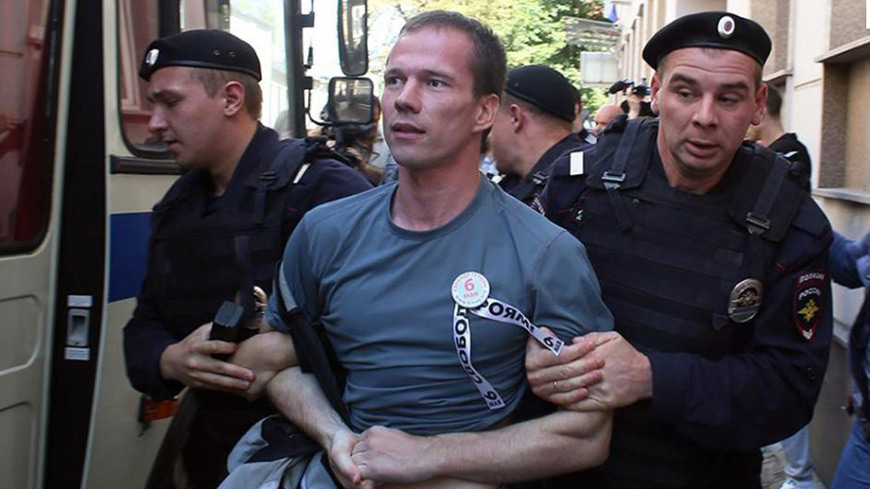
He describes the arrests of more than 260 people during anti-Putin protests across Russia — including St Petersburg — in October as “pretty much normal for any activist in the country”.
Dadin believes that pressure from civil society both in Russia and abroad were partially responsible for his release. He hopes for “justice for all people, not just Russians”.
Moving forward, Index is helping Dadin with his transition to life outside of prison and prioritising his health and also helping him to gain additional international exposure.
Turkey Blocks / Digital Activism
“We are now going to be the NetBlocks project and expand our work,” director of research at Turkey Blocks Isik Mater tells Index. The team are taking steps to formalise some of their tools and methodologies, expand into new regions that have similar needs and now cover several countries experimentally.
The Turkey Blocks team have also developed a new tool called Cost, which calculates the financial impact of mass-censorship. “Governments don’t tend to care about the human rights argument, so they don’t listen to it,” says Alp Toker, founder of Turkey Blocks. “But if you tell them ‘this will cost x million dollars of harm to GDP’ then they perk up because that can become a political issue, which is a very powerful method of convincing governments not to censor content.”
Turkey, however, has been quite quiet recently in terms of internet shutdowns, after a barrage of such incidents in the year following the attempted coup in July 2016. In fact, the Turkish government have been using Turkey Blocks data on internet shutdowns as a kind of audit, Toker explains. “We ran our first panel with the Turkish government just a few weeks ago, which is kind of historic,” he says. “We are seeing really positive things, and although they have a long way to go it should be noted that they’ve been willing to have a dialogue with civil society and with a human rights group.”
Index on Censorship is helping Turkey Blocks through the process of forming a board and incorporating public speaking training skills for Mater so that she too can begin to make more public appearances.
Maldives Independent / Journalism
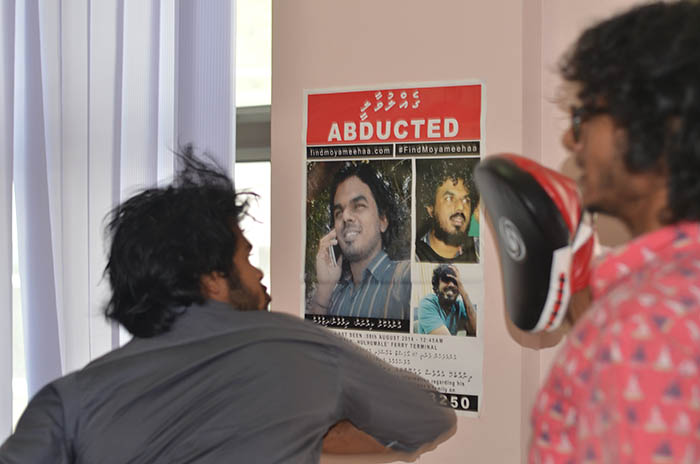
Staff at the Maldives Independent taking part in self-defence training.
Journalism fellows at Maldives Independent are going through a period of change. Former editor Zaheena Rasheed left the publication soon after awards week in London to take up a position on the online team at Al Jazeera, where she has recently been doing a lot of work covering the Rohingya refugee crisis from Bangladesh.
For personal reasons, Rasheed finds it difficult to be involved with the Maldives on top of this. “A friend of ours in the Maldives, Yameen Rasheed, was murdered at the end of the Index awards week in London and that was a big blow — it was very hard for me.”
Yameen Rasheed was a prominent blogger and internet activist who died from multiple stab wounds after an attack in the stairway of his apartment building in Malé on Sunday 23 April 2017. Index on Censorship has been involved in helping the Maldives Independent better secure their personal and office safety since Yameen Rasheed’s murder, including a recent self-defence training session.
A new editor took over at the Maldives Independent in mid-September and since then the publication has seen a noticeable spike in readership, and reporters are encouraged to get out and meet people, build relationships and contacts.
“It’s fairly calm at the moment — there have been no coups, for example — so I see this period as a time to hone the team’s reporting and feature writing skills,” a staff member tells Index. “We’re doing a broad mix of news and features: politics, tourism, mental health, rave culture, the hipster coffee scene, rural development, sex abuse cover-ups.”
Staff at the Maldives Independent hope that the publication continues to be a forum for debate and free speech, that it holds power to account, exposes wrongdoing and corruption and most of all give insight into a country that many people have only one image of.
[/vc_column_text][/vc_column][/vc_row][vc_row][vc_column][vc_basic_grid post_type=”post” max_items=”4″ element_width=”6″ grid_id=”vc_gid:1510228913303-fd0d57c2-b760-1″][/vc_column][/vc_row]
08 Nov 17 | Bahrain, Campaigns -- Featured, Middle East and North Africa
[vc_row][vc_column][vc_column_text]
Nabeel Rajab’s appeal against a two-year sentence for “spreading false news” is to conclude on 22 November, after a Bahraini appeals court today ignored the defence’s final arguments and denied Rajab bail. Rajab, an Index on Censorship Freedom of Expression Award winner is one of Bahrain’s highest profile human rights campaigners and president of the Bahrain Centre for Human Rights, was sentenced in July 2017.
Rajab faces another trial on 19 November in relation to his social media posts on twitter, for which he faces up to 15 years in prison, for a total of 17 years.
Rajab’s lawyers submitted video evidence of journalists and researchers denied entry into Bahrain which would dispute the charge that he “spread false news” by, among other things, stating the Bahraini government bars reporters and human rights workers from entering the country. However, the court, led by Judge Bader Al-Abdulla, today refused to play the evidence in court. Judge Al-Abdulla set 22 November as the final court hearing, when its judgement is expected.
Nabeel Rajab was sentenced in absentia to two years in prison on charges of “spreading false news” under article 134 of Bahrain’s Penal Code. His appeal began in September.
He is currently serving his sentence in Jau Prison, where he was transferred to on 25 October, after over six months in the Ministry of Interior Hospital. Rajab has been held in humiliating conditions and isolated from other inmates.
On 8 Nov, Rajab was transferred to the Appeals Court in a vehicle which prison officers told him was used to transfer people sentenced to death, as opposed to the regular transfer bus. Rajab was photographed throughout the transfer and was kept in a suffocating heat in the vehicle, in which he struggled breathe. There are currently 16 people on death row in Bahrain, the majority of them sentenced to death in 2017. In January, three torture victims were unlawfully executed; the UN condemned the killing.
Rajab’s brother was barred from attending the court. Observers from the British, American and German embassies were present at the trial.
Sayed Ahmed Alwadaei, Director of Advocacy, Bahrain Institute for Rights and Democracy: “Nabeel has been subject to humiliating treatment by Jau Prison’s administration and the appeals court continues to deny him a fair trial. Bahrain continues to deny journalists and NGOs access. This is a fact, which Bahrain has imprisoned Nabeel for stating. The Government of Bahrain’s zero tolerance policy to human rights defenders is appalling, and yet instead of condemnation, Britain whitewashes the abuses while the US approves new arms sales to Bahrain.”
[/vc_column_text][vc_row_inner][vc_column_inner width=”1/4″][vc_icon icon_fontawesome=”fa fa-times-circle” color=”black” background_style=”rounded” size=”xl” align=”right”][/vc_column_inner][vc_column_inner width=”3/4″][vc_column_text]
The campaign of judicial harassment against Nabeel Rajab must end. Index on Censorship demands that Bahrain’s government drop all charges and release him unconditionally.
[/vc_column_text][/vc_column_inner][/vc_row_inner][vc_column_text]
“Spreading False News”
The charges relate solely to TV interviews Rajab gave in 2014 and 2015. Without irony, prosecution papers from the criminal court proceedings, seen by BIRD, state that Rajab is being prosecuted for stating that the Bahraini government “derogates from freedom of opinion and of expression.” Bahrain’s prosecution has treated Rajab as a criminal for speech acts such as: “accusing the ruling system in the Kingdom of following a policy of repression” and of “arresting those opposed to the regime”; or alleging “the commission by responsible [government] bodies of crimes of killing and torture.” In the prosecution’s account Mr. Rajab has also made statements accusing the Bahraini government of “evasion of responsibility”; engaging in “sectarianism”; and “suppressing opposition and violating international agreements and covenants.”
Rajab was arrested on 13 June 2016 and has been detained ever since. He was held largely in solitary confinement in the first nine months of his detention, violating the UN Standard Minimum Rules for Non-Custodial Measures (Tokyo Rules) which state: “pre-trial detention shall be used as a means of last resort in criminal proceedings, with due regard for the investigation of the alleged offence and for the protection of society and the victim.”
In early April 2017, Rajab was admitted to the Bahrain Defence Force hospital for a necessary surgery. He was transferred back to police custody just a day later, before having recovered from his operation, and his health deteriorated significantly; from there he was transferred to the Ministry of Interior Clinic (Al-Qalaa), where he remains to date. Between April and August 2017, Rajab was unable to attend court, which held numerous hearings in his absence, including his sentencing. Rajab was transferred back to Jau Prison in October.
Rajab faces a concurrent trial on 19 November in which he faces up to 15 years in prison on charges related to his tweets exposing torture in a Bahraini prison and criticising the humanitarian cost of the war in Yemen. In September 2017, a new set of charges were brought against Rajab related to social media posts made in January 2017, when he was already in detention and without internet access. Rajab also faces a fourth set of charges related to a letter he penned to the New York Times in September 2016.
The UN Committee Against Torture has called for Rajab’s release.
The UK’s Middle East Minister Alistair Burt was in Bahrain in October, where he met with senior officials and expressed support for the government’s reform programme – a programme which only Bahrain and the UK claim exists. He said “The UK will continue to support Bahrain to deliver its ambitious reform initiatives, with a particular focus on rule of law and human rights.” There is no indication that they specifically raised Nabeel Rajab’s case.
In the US, the Trump Administration this year removed Obama-era human Rights conditions on arms sales, one of which was the unconditional release of Rajab. In September, the Trump Administration approved the sale of F-16 jets worth $2.78 billion.
[/vc_column_text][/vc_column][/vc_row][vc_row][vc_column][vc_custom_heading text=”Don’t lose your voice. Stay informed.” use_theme_fonts=”yes”][vc_separator color=”black”][vc_row_inner][vc_column_inner width=”1/2″][vc_column_text]Index on Censorship is a nonprofit that campaigns for and defends free expression worldwide. We publish work by censored writers and artists, promote debate, and monitor threats to free speech. We believe that everyone should be free to express themselves without fear of harm or persecution – no matter what their views.
Join our mailing list (or follow us on Twitter or Facebook) and we’ll send you our weekly newsletter about our activities defending free speech. We won’t share your personal information with anyone outside Index.[/vc_column_text][/vc_column_inner][vc_column_inner width=”1/2″][gravityform id=”20″ title=”false” description=”false” ajax=”false”][/vc_column_inner][/vc_row_inner][vc_separator color=”black”][/vc_column][/vc_row][vc_row][vc_column][vc_basic_grid post_type=”post” max_items=”12″ style=”load-more” items_per_page=”4″ element_width=”6″ grid_id=”vc_gid:1510147997421-a1204285-8982-7″ taxonomies=”3368″][/vc_column][/vc_row]
08 Nov 17 | Index in the Press
A Russian radio journalist who narrowly survived a stabbing attack last month said in an interview with The Associated Press on Wednesday that the attacker was intent on killing her and had planned it. Read the full article
06 Nov 17 | Digital Freedom, News and features
[vc_row][vc_column][vc_column_text]
Facebook has received much criticism recently around the removal of content and its lack of transparency as to the reasons why. Although it maintains their right as a private company to remove content that violates community guidelines, many critics claim this disproportionately targets marginalised people and groups. A report by ProPublica in June 2017 found that Facebook’s secret censorship policies “tend to favour elites and governments over grassroots activists and racial minorities”.
The company claims in their community standards that they don’t censor posts that are newsworthy or raise awareness, but this clearly isn’t always the case.
The Rohingya people
Most recently, almost a year after the human rights groups’ letter, Facebook has continuously censored content related to the Rohingya people, a stateless minority who mostly reside in Burma. Rohingya have repeatedly been banned from Facebook for posting about atrocities committed against them. The story resurfaced amid claims that Rohingya people will be offered sterilisation in refugee camps.
Refugees have used Facebook as a tool to document the accounts of ethnic cleansing against their communities in refugee camps and Burma’s conflict zone, the Rakhine State. These areas range from difficult to impossible to be reached by reporters, making first-hand accounts so important.
Rohingya activists told the Daily Beast that their accounts are frequently taken down or suspended when they post about their persecution by the Burmese military.
Dakota Access Pipeline protesters
In September 2016 Facebook admitted removing a live video posted by anti-Dakota Access Pipeline activists in the USA. The video showed police arresting around two dozen protesters, although after the link was shared access was denied to viewers.
Facebook blamed their automated spam filter for censoring the video, a feature that is often criticised for being vague and secretive.
Palestinian journalists
In the same month as the Dakota Access Pipeline video, Facebook suspended the accounts of editors from two Palestinian news publications based in the occupied West Bank without providing a reason. There are no reports of the journalists violating the networking site’s community standards, but the editors allege their pages may have been censored because of a recent agreement between the US social media giant and the Israeli government aimed at tackling posts inciting violence.
Facebook later released a statement which stated: “Our team processes millions of reports each week, and we sometimes get things wrong.”
US police brutality
In July 2016 a Facebook live video was censored for showing the aftermath of a black man shot by US police in his car. Philando Castile was asked to provide his license and registration but was shot when attempting to do so, according to Lavish Reynolds, Castile’s girlfriend who posted the video.
The video does not appear to violate Facebook’s community standards. According to these rules, videos depicting violence should only be removed if they are “shared for sadistic pleasure or to celebrate or glorify violence”.
“Facebook has long been a place where people share their experiences and raise awareness about important issues,” the policy states. “Sometimes, those experiences and issues involve violence and graphic images of public interest or concern, such as human rights abuses or acts of terrorism.”
Reynold’s video was to condemn wrongful violence and therefore was appropriate to be shown on the website.
Facebook blamed the removal of the video on a glitch.
Swedish breast cancer awareness video
In October 2016, Facebook removed a Swedish breast cancer awareness campaign that had depictions of cartoon breasts. The breasts were abstract circles in different shades of pinks. The purpose of the video was to raise awareness and to educate, meaning that by Facebook’s standards, it should not have been censored.
The video was reposted and Facebook apologised, claiming once again that the removal was a mistake.
The Autumn issue of Index on Censorship magazine explored the censorship of the female nipple, which occurs offline and on in many areas around the world. In October 2017 a Facebook post by Index’s Hannah Machlin on the censoring of female nipples was removed for violating community standards.
“Napalm girl” Vietnam War photo
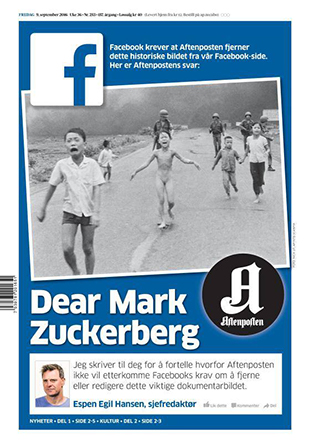 A month earlier, in a serious blow to media freedom, Facebook removed an iconic photo from the Vietnam War. The photo is widespread and famous for revealing the atrocities of the war, especially on innocent people like children.
A month earlier, in a serious blow to media freedom, Facebook removed an iconic photo from the Vietnam War. The photo is widespread and famous for revealing the atrocities of the war, especially on innocent people like children.
In a statement made following the removal of the photograph, Index on Censorship said: “Facebook should be a platform for … open debate, including the viewing of images and stories that some people may find offensive, is vital for democracy. Platforms such as Facebook can play an essential role in ensuring this.”
The newspaper whose post was censored posted a front-page open letter to Mark Zuckerberg stating that the CEO was abusing his power. After public outrage and the open letter, Facebook released a statement claiming they are “always looking to improve our policies to make sure they both promote free expression and keep our community safe”.
Facebook’s community standards claim they remove photos of sexual assault against minors but don’t mention historical photos or those which do not contain sexual assault.
The young woman shown in the photo, who now lives in Canada, released her own statement saying: “I’m saddened by those who would focus on the nudity in the historic picture rather than the powerful message it conveys. I fully support the documentary image taken by Nick Ut as a moment of truth that capture the horror of war and its effects on innocent victims.”[/vc_column_text][/vc_column][/vc_row][vc_row][vc_column][vc_basic_grid post_type=”post” max_items=”4″ element_width=”6″ grid_id=”vc_gid:1509981254255-452e74e2-3762-2″ taxonomies=”1721″][/vc_column][/vc_row]
03 Nov 17 | Artistic Freedom, News and features
[vc_row][vc_column][vc_single_image image=”96393″ img_size=”full” add_caption=”yes” alignment=”center”][vc_column_text]Cartoonist Ramón Esono Ebalé has been named the winner of the 2017 Cartoonists Rights Network International Award for Courage in Editorial Cartooning.
An outspoken and gifted graphic novelist and cartoonist, Ebalé is imprisoned in Equatorial Guinea’s notorious Black Beach prison under as yet unspecified charges.
“The Equatorial Guinean government, one of the most notorious kleptocracies in Africa, is clearly angered by his outspoken comic and cartoon based criticism of the ruling family,” Joel Pett, president of the CRNI board of directors, wrote in a statement accouncing the award.
Ebalé, alias Jamon y Queso, was arrested on 16 September in Malabo, the capital of Equatorial Guinea. He was initially questioned by security agents in relation to his cartoons that are critical of President Obiang and other government officials. News outlets reported a few days later that he is being investigated for alleged money laundering and counterfeiting money.[/vc_column_text][/vc_column][/vc_row][vc_row][vc_column width=”1/2″][vc_single_image image=”96264″ img_size=”full” onclick=”custom_link” link=”https://www.indexoncensorship.org/newsite02may/2017/10/exhibition-repressive-governments-world-fear-cartoonists/”][/vc_column][vc_column width=”1/2″][vc_column_text]
Repressive governments the world over fear cartoonists. Cartoonists get straight to the point. Join Index, CRNI and the UK’s Professional Cartoonists Organisation for an exploration of cartooning.[/vc_column_text][/vc_column][/vc_row][vc_row][vc_column][vc_custom_heading text=”Don’t lose your voice. Stay informed.” use_theme_fonts=”yes”][vc_separator color=”black”][vc_row_inner][vc_column_inner width=”1/2″][vc_column_text]Index on Censorship is a nonprofit that campaigns for and defends free expression worldwide. We publish work by censored writers and artists, promote debate, and monitor threats to free speech. We believe that everyone should be free to express themselves without fear of harm or persecution – no matter what their views.
Join our mailing list (or follow us on Twitter or Facebook) and we’ll send you our weekly newsletter about our activities defending free speech. We won’t share your personal information with anyone outside Index.[/vc_column_text][/vc_column_inner][vc_column_inner width=”1/2″][gravityform id=”20″ title=”false” description=”false” ajax=”false”][/vc_column_inner][/vc_row_inner][vc_separator color=”black”][/vc_column][/vc_row]














 A month earlier, in a serious blow to media freedom, Facebook
A month earlier, in a serious blow to media freedom, Facebook